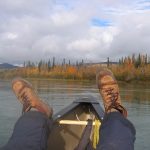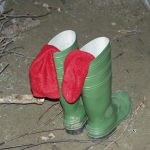CANOEING IN THE YUKON
THE BIG SALMON RIVER INTO THE YUKON RIVER – NORTHWEST TERRITORIES CANADA
The water was cold and it gripped my chest like a vice but it was the power of the current that was sweeping me downstream that was truly awesome. A couple of strong strokes and I was able to feel the bottom but the unrelenting pressure of the water kept taking my feet away as I struggled to gain the solid ground. The cold water was starting to sap my strength. With a desperate mixture of swimming and crawling I at last floundered to the bank, grabbed my towel and rushed shivering to my tent to get dry and warm.After ten days in the wilderness this was the only way of washing but it was worth it, fifteen minutes later I felt refreshed and my body was glowing.
It seemed an age ago, when we, a disparate group of Europeans, had put on at the headwater of the Big Salmon River in the Yukon Territory of Canada. Since then we had paddled 150 miles, learnt to swiftly put up our camp, light a fire and get the coffee on. We could read the river, negotiate the twists and turns round log jams and shoot moderate rapids in our heavily laden canoes; we had come together as an efficient unit that could move through the wilderness with ease. Damn it we could even catch fish to feed ourselves!
The group consisted of three Germans, two Swiss and three English, the age range was 25 to 67 and the language around the camp fire was a mix of German, English and Swiss/German. Every member of the group had paddled previously but the majority had never paddled on swift moving water before, but where better to learn canoeing skills. We had had encounters with eagles, moose, beaver, wolf and otters, and had a grizzly come through the camp. We had stood in the quiet, cold of the northern nights to watch the aurora borealis with its haunting luminescence dancing across the inky sky. We had bush-whacked through the forest blazing a trail to the tops of mountains and cliffs to get a view of the area we were paddling through, and we had successfully fished the river for salmon and grayling.
One day we had met a couple of local hunters who sat with us for a chat they said that we were the only group of people in a 50 miles radius. They were two close friends who every September took a week off work, have a ‘lads week’ together to paddle down the river and shoot a moose. They would then butcher it for the freezer; considering the size of a moose their freezers must be of epic dimensions!
Days consisted of having breakfast at 7 am, breaking camp, paddling, lunch, paddling and then stopping to put up camp again on another gravel bar by the river. The pace was leisurely which gave us time for fishing, swimming and relaxing around camp. Toilet facilities were a trench dug away from the river with the paper being burned in the fire. We practised ‘no-trace camping’ and washed mainly in cold water from the river, which was then disposed of in a hole, dug in the ground well away from any water course. In an effort to discourage bears, all food was placed in airtight containers, the kitchen waste burned, when cleaning our teeth we spat into the fire and all toiletries and suntan lotion were removed from our tents to the kitchen.
There is always something satisfying in traversing a river from its source to its ultimate demise in the sea or another river. For me it gives a feeling of completion; I have seen the river grow from a stream and have followed its history as it moves down from the mountains. It took us ten days to travel the 150 miles from Quiet Lake, Sandy Lake, Big Salmon Lake, down the Big Salmon River to the Yukon River. It seemed ridiculous that with just two days to go and a rendezvous with our pickup we had another 71 miles to travel. After the swim in the Yukon and feeling its urgency to get to the sea knew that the 71 miles would be quite an easy paddle. With the river travelling at over seven miles an hour we could even just sit in the boats and we would be there in 10 hours.
On the river next day the Yukon whispered to us; the strong, fast current moving the coarse sand grains along the bed of the river creates a noise that is quiet audible but the shape of the canoe amplifies the sound. Constantly with us and variable in volume the river generally whispered but sometimes roared as we paddled the last days of the trip on the Yukon River to get out at Carmacks.
The Yukon Territory is located in the north west of Canada and borders Alaska. It is twice the size of the UK with a population of 33,500 and 80% of the area is classified as wilderness. The Yukon River is approximately 2,000 miles long and is the fifth longest river in North America.
My preference for paddling in the Autumn, at the end of the season, is that there are a lot, lot less biting insects, the bears are full of salmon and berries and so are chilled out, and the trees are turning colour to give a stunning backdrop to any paddling trip.
The Klondike Gold Rush, the most famous gold rush in history, took place in just the two years of 1897-98. By 1899 $50 million dollars’ worth of gold had been mined (multiply by 20 for today’s prices) mainly by amateur stampeders who flooded into the area from all over the continent. A hundred years ago the area was busy with people and boats moving on the river. Since then the Yukon Territory has reverted to a quiet, unpopulated wilderness beloved by the adventurer and explorer.
The poems and writings of Robert Service capture the essence of travel in northern lands. Robert William Service was born on January 16, 1874 to a Scottish bank clerk and the daughter of an English factory owner. At the age of 15 he followed his father into the banking business, but in 1896 he emigrated to Canada and eventually obtained a posting in Whitehorse in the Yukon Territories 1903. He was inspired, as he tells it, by his surroundings “It was Saturday night, and from the various bars I heard sounds of revelry. The line popped into my mind: ‘A bunch of boys were whooping it up’ and it stuck there. Good enough for a start”. He travelled in Europe and purchased a villa in Brittany. During the First World War he served in an America volunteer ambulance unit and became a war correspondent for the Canadian government. With the outbreak of the Second World War he escaped from Poland to Hollywood where he lived in exile until the end of the war and his return to France. Though he never returned to the Yukon after he left in 1912 it remained a part of his life until his death in 1958.

